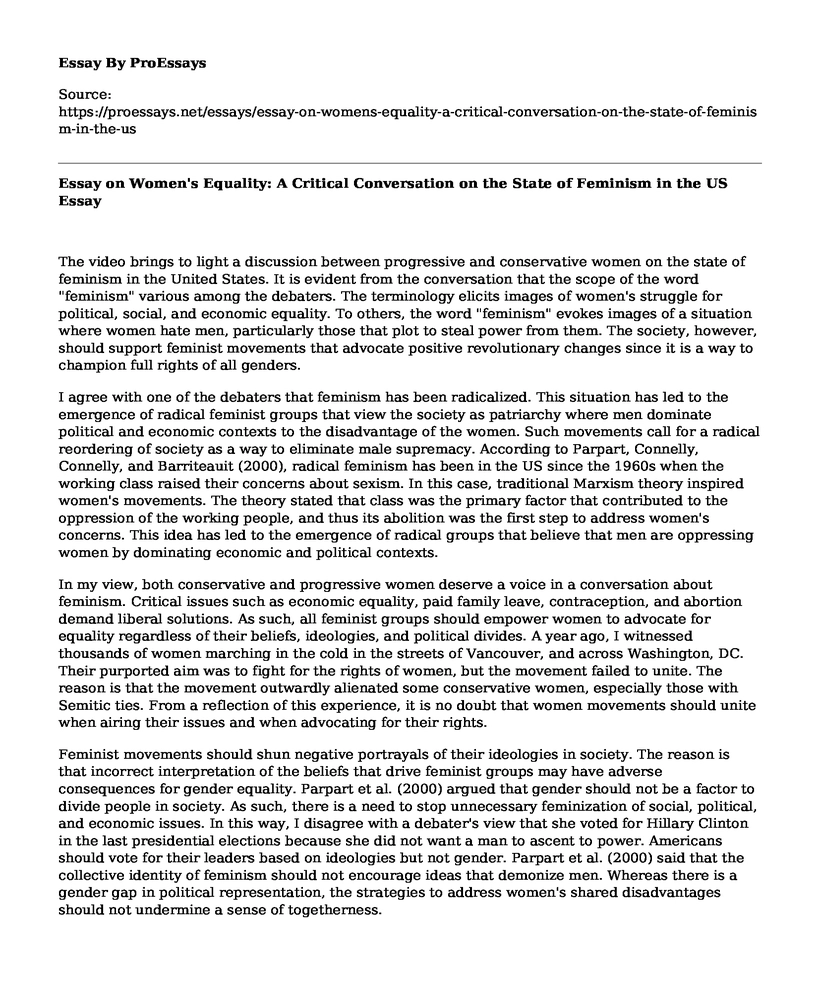The video brings to light a discussion between progressive and conservative women on the state of feminism in the United States. It is evident from the conversation that the scope of the word "feminism" various among the debaters. The terminology elicits images of women's struggle for political, social, and economic equality. To others, the word "feminism" evokes images of a situation where women hate men, particularly those that plot to steal power from them. The society, however, should support feminist movements that advocate positive revolutionary changes since it is a way to champion full rights of all genders.
I agree with one of the debaters that feminism has been radicalized. This situation has led to the emergence of radical feminist groups that view the society as patriarchy where men dominate political and economic contexts to the disadvantage of the women. Such movements call for a radical reordering of society as a way to eliminate male supremacy. According to Parpart, Connelly, Connelly, and Barriteauit (2000), radical feminism has been in the US since the 1960s when the working class raised their concerns about sexism. In this case, traditional Marxism theory inspired women's movements. The theory stated that class was the primary factor that contributed to the oppression of the working people, and thus its abolition was the first step to address women's concerns. This idea has led to the emergence of radical groups that believe that men are oppressing women by dominating economic and political contexts.
In my view, both conservative and progressive women deserve a voice in a conversation about feminism. Critical issues such as economic equality, paid family leave, contraception, and abortion demand liberal solutions. As such, all feminist groups should empower women to advocate for equality regardless of their beliefs, ideologies, and political divides. A year ago, I witnessed thousands of women marching in the cold in the streets of Vancouver, and across Washington, DC. Their purported aim was to fight for the rights of women, but the movement failed to unite. The reason is that the movement outwardly alienated some conservative women, especially those with Semitic ties. From a reflection of this experience, it is no doubt that women movements should unite when airing their issues and when advocating for their rights.
Feminist movements should shun negative portrayals of their ideologies in society. The reason is that incorrect interpretation of the beliefs that drive feminist groups may have adverse consequences for gender equality. Parpart et al. (2000) argued that gender should not be a factor to divide people in society. As such, there is a need to stop unnecessary feminization of social, political, and economic issues. In this way, I disagree with a debater's view that she voted for Hillary Clinton in the last presidential elections because she did not want a man to ascent to power. Americans should vote for their leaders based on ideologies but not gender. Parpart et al. (2000) said that the collective identity of feminism should not encourage ideas that demonize men. Whereas there is a gender gap in political representation, the strategies to address women's shared disadvantages should not undermine a sense of togetherness.
Conclusion
Conclusively, feminism encompasses a complex intersection of personal and political ideologies. This social and collective identity, however, should not undermine a sense of togetherness between men and women. Feminist movements play essential in advocating for gender equality besides airing the issues facing the women. Thus, such groups should shun ideas that encourage gender-related radical ideas since it is a negative portrayal of feminism.
Reference
Parpart, J. L., Connelly, P., Connelly, M. P., & Barriteau, E. (Eds.). (2000). Theoretical
perspectives on gender and development. International Development Research Centre (IDRC).
Cite this page
Essay on Women's Equality: A Critical Conversation on the State of Feminism in the US. (2023, Feb 06). Retrieved from https://proessays.net/essays/essay-on-womens-equality-a-critical-conversation-on-the-state-of-feminism-in-the-us
If you are the original author of this essay and no longer wish to have it published on the ProEssays website, please click below to request its removal:
- Gender Inequality in Wage Earnings in Canada Essay
- Comparison Between Haitian and American Economies Essay
- Is the Gender Gap Persistent in America? - Research Paper
- Research Paper on America and the Great War
- Paper Example on U.S. vs. Canada: Comparing Health Care Cost and Quality
- Essay Example on Marcus Garvey: A Hero of African-American History
- Understanding Electricity Rates: Demand Response & Tariffs - Report Sample







